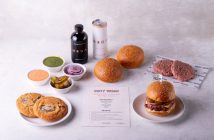Wareing’s father was a constant source of support and grounding for this ambitious chef during his climb to gastronomic success. “My dad taught me about old fashioned hard work. He never looked at my school grades; university, what was that? What he taught me was one of the most important things in life, and that’s common sense. I got this far, not by going to Oxford or Cambridge, I got here through common sense, determination and hard work. Those are all the factors that he installed in me. And I didn’t need to be some grade-A student to do it either.
“From a seaside town in Southport to one of the gastronomic capitals of the world, it’s a big thing, and it didn’t happen overnight. It was a lot of blood, sweat and tears – a lot of tears – and I had a lot of support from my dad who was always at the end of a telephone. But never did he once turn around and say to me, come back home, or don’t worry, do something different, or don’t listen to them. It was just support. He couldn’t advise me on my world, on catering and London, but he just helped me get through it, and not enough parents do that nowadays.”
So what advice would Marcus give to young chefs aspiring to culinary greatness? “Believe in everyone you speak to, take on board what your peers, your lecturers, your mum, your dad says, listen to everybody who has got an opinion who is older and wiser than you, whether you agree with it or not, just take it and store it, and use it. Be prepared to work bloody hard, make sacrifices and if you want something go out and get it.”
Looking back on the fallout with Gordon and the departure from Ramsay Holdings, Marcus is much more philosophical nowadays. “At the same time as leaving the company I was battling for the site itself, which was a great game of chess that you learn to play but I don’t know the rules. But I got through it, I got my check-mate and I got what I wanted, which was this restaurant. This meant more to me than anything. I could only ever describe it as what it must be like to win the EuroMillions. For me it was a complete new lease of generated energy that I didn’t even know I had, and that’s why I get up now with a spring in my step. I feel like I’ve started my whole career again. Behind me I’ve got this amazing CV that I’ve built up and a reputation, and now I’m here to stand on top of it and bounce off it, and that’s just from being loyal to the kitchen.”
Throughout the media storm and the legal battle, Marcus took solace in the one place that has always been a refuge for him. “My kitchen was my comfort zone, it was the place I could escape from the politics. I could escape the fight. When you go into the lunch or dinner service you just switch off, you’ve got your cooks, your service, your spoon, and your food. And that for me was almost like counselling, it was like therapy. My strength was by not walking out of here, by not being absent. Right up to the very last dish that left that kitchen as Petrus, I stood over it. So no one could turn around and say, well he walked away at the end, he didn’t do this, he didn’t do that. I was there to the very last dish. I closed the door – I was going to say ‘and threw away the key’ – but I didn’t, I kept it,” he laughs, recalling that moment of joy; “I closed the door and put the key in my pocket! F**king lovely!”
Readers will have seen Marcus on the BBC’s Great British Menu, cooking for the Queen at the final banquet in 2006, and as a judge for the North West heat in recent years. “I think GBM gives the public an insight. It focuses so much on food and food traceability, on the most important thing which is going back to the basic ingredients, where it comes from, who’s grown it, who’s reared it, who’s pulled it out the ground, and I think there are very few TV shows that do that.
“People ask me, why do you do it, why don’t you do certain other shows? I do it because it represents what I believe in and I will always give GBM my time, because it’s done a lot for my restaurant, it’s done a lot for British produce. I will guarantee that somewhere in this restaurant today someone will have come in here for an egg custard tart because I cooked it for the Queen four and a half years ago for her eightieth birthday and it’s become legendary in its own little way; quite surreal. But that’s the power of the brand and television.”
Over the past twenty years the culinary scene has evolved quite dramatically, but at the core there has always been fine dining, and it’s from fine dining that all the other trends such as molecular gastronomy have emerged in one way or another. “Food has gone mental. It’s Heston, it’s El Bulli, it’s chefs from all over the globe, from Tetsuya to Thomas Keller, to Daniel Boulud to Jean-Georges. When Jean-Georges opened Vong here twelve years ago, it was huge – East meets West cuisine – that was one of the biggest successes in London, nobody had seen anything like it. But food has trends that come and go, yet fine dining always stays. It’s always fine dining. I read food critics who say that fine dining is a thing of the past; no chance. It’s the past, present and future, because it’s been there forever, since kings and queens lorded it up in their great halls, that’s fine dining, and where it was once for royalty, it’s now for everybody.”
Marcus turns forty this year and this has put life into a new perspective for him. Far from the finicky and obsessive character that was portrayed in the recent documentary about Michelin, Marcus is confronting the next stage of his life with honesty and integrity. “I’m going to start enjoying my food now. I’m going to stop following a guideline of what I believe Michelin want of me, I’m just going to do what I want to do and my business will reflect whether I’m doing it right or wrong. And so far my business reflects that I’m doing it absolutely right.
“I want to enjoy my career, I want to enjoy my life in cookery, I don’t want to die by the sword, and I certainly don’t want to put myself in a coffin because I want three stars. I’ve got three fabulous kids at home, I want to enjoy them growing up. I love cookery, but you’ve got to have a bit of a reality check sometimes. There is a whole big world out there. At the age of forty this year, I’ve made that promise to myself, that’s my present to myself.”
Having slaved over a stove in professional kitchens from the age of nineteen, what has Marcus learnt from the rollercoaster experience that life has dealt him? “Looking back on it, I think I needed to relax, I think children put life into perspective a lot, not to take everything too seriously, but I do, I am a perfectionist, I’ll never stop being that, I can’t help it but I just want to enjoy it now. There’s still a lot that I want to do. I’m still incredibly ambitious and I never want to stop really. I want to be able to retire and enjoy it at the same time. Cookery is good like that, you just need to invest in people and give them a piece of it, hand this baton over. Pretty much like the Roux brothers, they’ve passed it through the family, though I don’t think I’ll do that unless my kids want it. But if it’s not family it’ll be someone who’s very close. I’ve got a couple of talented chefs in my kitchen; what you need is to team up with the right people and I will hopefully provide that for them if that’s what they so wish.”
And long may you prosper; and your fabulous egg-custard tart.




